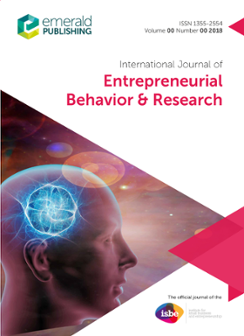放我一马吧!创业中闲置资源和技术介导的人力资本投资的探索
IF 4.7
2区 管理学
Q1 BUSINESS
International Journal of Entrepreneurial Behavior & Research
Pub Date : 2022-01-17
DOI:10.1108/ijebr-10-2020-0731
引用次数: 6
摘要
目的探讨资源闲置和技术中介人力资本投资对个体创业意向的影响。作者关注个人通过教育和工作进行的人力资本投资,分析了零工经济中正规在线学习机会、非正规技能发展和创业意图之间的关系。本研究利用一个新的数据集,将行政税收数据与对8,528个低收入和中等收入(LMI)家庭的调查合并在一起,使用机器学习和倾向得分加权来检验进行这些技术中介人力资本投资的个人与不进行这些投资的类似个人相比,创业意图的可能性会增加。作者发现,参加在线学习和在零工经济中工作,都与创业意图的几率增加显著相关。此外,通过各种稳健性和机制检验,作者发现技术中介是这些关系中的一个重要因素,非正式技能发展和职业准备是零工就业影响创业意图的一种方式。由于该研究的数据来自横断面调查,作者无法对在线学习、零工就业和创业意图之间的关系做出因果推论。因此,未来的研究应探索纵向数据的来源。本研究对寻求提高低收入家庭创业精神的个人和政策制定者具有实际意义。尽管在企业层面上对闲置资源、技术和创新之间的关系进行了大量研究,但在个人层面上的研究却很少,尤其是在LMI个体之间。作者开始填补这个重要的空白。本文章由计算机程序翻译,如有差异,请以英文原文为准。
Cut me some slack! An exploration of slack resources and technology-mediated human capital investments in entrepreneurship
PurposeIn this paper, the authors explore the relationship that slack resources and technology-mediated human capital investments can have on individuals’ entrepreneurial intentions. Focusing on human capital investments that individuals make through education and work, the authors analyze the relationship among formal online learning opportunities, informal skill development in the gig economy and entrepreneurial intentions.Design/methodology/approach Leveraging a novel dataset that merges administrative tax data with a survey of over 8,528 low- and moderate income (LMI) households, this study uses machine learning and propensity score weighting to examine the likelihood that individuals who make these technology-mediated human capital investments will have increased odds of entrepreneurial intentions when compared to similar individuals who do not make these investments.Findings The authors find that both partaking in online learning and working in the gig economy are significantly associated with increased odds of entrepreneurial intentions. Furthermore, through a variety of robustness and mechanism checks, the authors find that technology-mediation is an important factor in these relationships and that informal skill development and career preparation is one way in which gig employment influences entrepreneurial intentions.Research limitations/implications As the study’s data come from a cross-sectional survey, the authors cannot make causal inferences about the relationship between online learning, gig employment and entrepreneurial intentions. Thus, future research should explore sources of longitudinal data.Practical implications This study has practical implication for individuals and policymakers that seek to increase entrepreneurship among LMI households.Originality/value Despite a wealth of research on the relationships among slack resources, technology and innovation at the firm level, there is little of this research at the individual level – especially among LMI individuals. The authors begin to fill this important gap.
求助全文
通过发布文献求助,成功后即可免费获取论文全文。
去求助
来源期刊
CiteScore
10.20
自引率
16.40%
发文量
94
期刊介绍:
The International Journal of Entrepreneurial Behavior & Research (IJEBR) has a unique focus on publishing original research related to the human and social dynamics of entrepreneurship, and entrepreneurial management in small and growing organizations. The journal has an international perspective on entrepreneurship and publishes conceptual papers and empirical studies which bring together issues of interest to academic researchers and educators, policy-makers and practitioners worldwide.The editorial team encourages high-quality submissions which advance the study of human and behavioural dimensions of entrepreneurship and smaller organizations. Examples of topics which illustrate the scope of the journal are provided below. Topicality Nascent entrepreneurship and new venture creation Management development and learning in smaller businesses Enterprise and entrepreneurship education, learning and careers Entrepreneurial psychology and cognition Management and transition in smaller, growing and family-owned enterprises Corporate entrepreneurship and venturing Entrepreneurial teams, management and organizations Social, sustainable and informal entrepreneurship National and international policy, historical and cultural studies in entrepreneurship Gender, minority and ethnic entrepreneurship Innovative research methods and theoretical development in entrepreneurship Resourcing and managing innovation in entrepreneurial ventures.

 求助内容:
求助内容: 应助结果提醒方式:
应助结果提醒方式:


